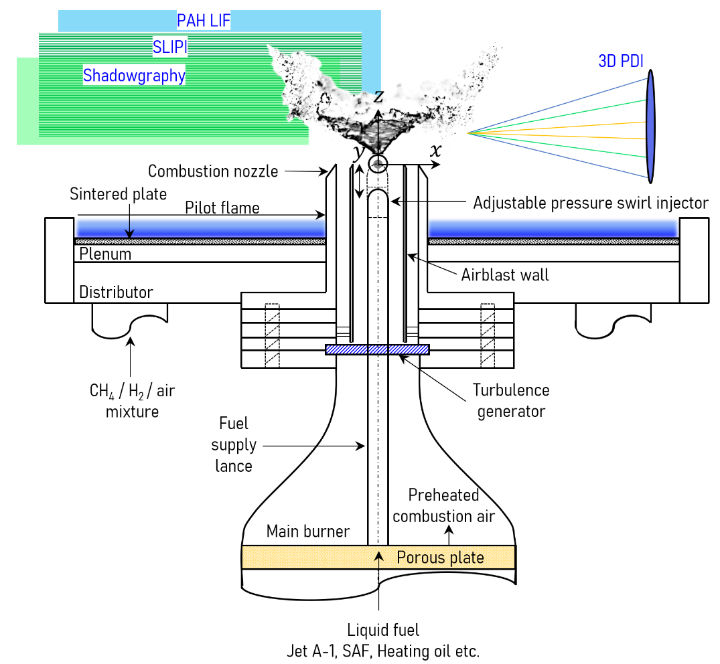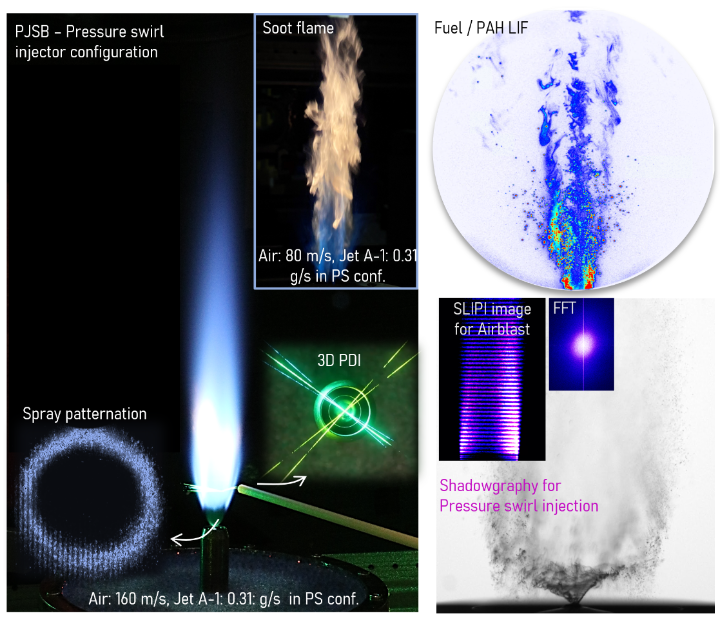As part of the research activities of our Emmy Noether Junior Research Group (DFG - Emmy Noether Programme), we advance the fundamental understanding of interactions between turbulent flow, reaction chemistry and multiple phases that govern the pollutant formation as well as fuel and load flexibility of combustion concepts (GEPRIS). This is of utmost relevance for the further development of clean, sustainable, and environmentally friendly technologies, which become almost emission-free when using CO2-neutral liquid fuels. For an effective minimization of the climate impact of thermochemical energy conversion concepts, the reduction of secondary emissions (known in English as "non-CO2 effects") such as nitrogen oxides and soot is essential. However, the lack of suitable injection and combustion concepts impairs the realization of the desired flexibility with simultaneously low emissions. The complexity of the inherent nonlinearities and multilateral interactions on multiple scales is accompanied by a lack of quantitatively reliable data. Our current research aims to close this gap.
Our pioneering work integrates cutting-edge laser-based techniques like multi-phase PIV and LIF to create advanced measurement systems. By applying these innovations, we capture turbulent flows and reactive scalars in highly complex multiphase environments. These fixed diagnostic systems, combined with traversing measurement objects, ensure comprehensive examinations across various setups, from burner systems to flow channels, revolutionizing our understanding of fluid dynamics and combustion processes.
The project aims to enhance combustion processes for liquid renewable fuels, achieving nearly emission-free operation by optimizing atomization through turbulence modulation, enhancing vaporization rates, and minimizing pollutant formation. Research investigates the impact of turbulence on primary breakup and atomization of different injection concepts, using various measurement techniques to analyze the influence of fuel composition and physical properties on spray quality. Ongoing and upcoming projects explore the effects of fuel temperature variation, vaporization in high-turbulence flows with real fuels, and ambient conditions on atomization, mixture formation, flame stabilization, and emissions in turbulent reacting multiphase flows.
We apply innovative optical diagnostics and ML-based data analysis tools to quantify turbulence - chemistry - phase interactions with the overarching objective to utilise gsa phase turbulence more effectively to atomize fuel enhance fuel flexibility and prevent emission formation.
We focus on advancing experimental data analysis through machine learning, which includes the development of novel methods for synthetic data generation and integration with AI models for tasks like image segmentation and optical flow detection. We aim to developing a comprehensive AI-assisted data analysis suite, unifying various AI tasks under one umbrella with industrial-level standards.
We couple experimental data with numerical simulations by means of AI-approaches to enhance the scalar resolution beyond the measured quantities.
We relax / redefine design criteria of liquid fuel injection concepts in order to be able to use additive manufacturing processes in their development.
The insights gained will significantly support the development of fuel- and load-flexible combustion concepts, expand the scalability of liquid fuel-powered micro gas turbine systems, and enable close-to emission-free operation when used in combination with carbon-neutral liquid fuels. Combustion systems of this type can be used, for example, in innovative engine concepts (e.g. hybrid systems) and in gas turbines for power generation. Related technologies further offer a low risk solution to decarbonise the energy, industry and transportation sectors and are essential to assure the current standard of energy security, continuous supply and mobility with low carbon footprint.
Additional information / Get involved
If you are interested in our project, have further questions, or would like to support us through student work, internships, or thesis projects, we would be delighted to hear from you via email or phone. Contact details can be found below.
Contact

Fabian Hampp
Dr.Junior Research Group Leader






